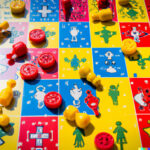Real classic board games have a timeless appeal that transcends generations. These games, such as Monopoly, Scrabble, and Chess, have been cherished for decades and continue to be enjoyed by people of all ages. The history, evolution, and enduring popularity of these classic board games are a testament to their lasting impact on popular culture.
In this article, we will delve into the origins and history of classic board games like Monopoly, Scrabble, and Chess. We will explore how these games have evolved over time and adapted to changing trends and preferences in gameplay. Additionally, we will examine why certain classic board games like Risk and Clue have maintained their appeal among players from different eras.
As technology continues to advance, the rise of digital gaming has undoubtedly impacted the classic board game industry. We will analyze the influence of technology on these traditional games and how they have managed to thrive amidst the digital age. Moreover, we will discuss the strategy and critical thinking skills involved in playing classic board games and their positive impact on social interaction and cognitive development.
History of Classic Board Games
The history of classic board games like Monopoly, Scrabble, and Chess dates back several centuries, with each game having its own unique origin story. Monopoly, for example, was created by Elizabeth Magie in 1903 as a way to demonstrate the negative aspects of the concentration of wealth. The game was later adapted and popularized by Charles Darrow during the Great Depression in the 1930s.
Scrabble, on the other hand, was invented by Alfred Butts in 1938 and originally named “Lexiko” before being rebranded as Scrabble in the late 1940s. Chess has an even longer history, with origins that can be traced back to India in the 6th century.
These classic games have not only stood the test of time but have also gone through periods of evolution and adaptation. For instance, Monopoly has seen countless variations and editions over the years, incorporating different themes and pop culture references to stay relevant with changing times. Scrabble has also had its fair share of changes, including international rules standardization and digital adaptations. Chess remains relatively unchanged in terms of rules and gameplay but has continued to grow in popularity globally.
Despite living in a digital age, these classic board games continue to be beloved by people of all ages across the world. In fact, board game sales have been steadily increasing over recent years as people rediscover their love for traditional gaming experiences. This enduring appeal speaks volumes about the timeless nature of these games and their ability to bring people together in friendly competition while exercising their strategic thinking skills.
| Classic Board Game | Year of Origin |
|---|---|
| Monopoly | 1903 (rebranded in the 1930s) |
| Scrabble | 1938 (rebranded in the late 1940s) |
| Chess | Originated around 6th century (in India) |
Evolution of Gameplay
The evolution of gameplay in classic board games has been a fascinating journey, with games like Monopoly, Scrabble, and Chess undergoing significant changes over the years. These changes have allowed these games to remain relevant and appealing to new generations of players.
For example, Monopoly, originally created in 1903, has seen various themed versions and editions that cater to different interests and pop culture phenomena. From Star Wars to The Simpsons, Monopoly has adapted to reflect the changing tastes of society.
Similarly, Scrabble has evolved by introducing digital versions and online play options, making it more accessible to a wider audience. The game has also expanded its dictionary to include modern slang and colloquial terms, ensuring that it remains engaging for contemporary players.
Chess, often regarded as the ultimate test of strategy and skill, has also adapted with the times. With the rise of online gaming platforms, players can now compete in virtual chess tournaments against opponents from around the world. This digital evolution has breathed new life into this ancient game, allowing it to thrive in the modern era.
| Classic Board Game | Evolution |
|---|---|
| Monopoly | Themed versions and editions reflecting changing tastes of society. |
| Scrabble | Digital versions and expanded dictionary to include modern slang and colloquial terms. |
| Chess | Online gaming platforms for virtual tournaments against opponents worldwide. |
These adaptations not only breathe new life into classic board games but also ensure their continued relevance in a world increasingly dominated by digital entertainment. By embracing change while staying true to their core concepts, classic board games have proven themselves to be timeless sources of entertainment that continue to captivate players of all ages.
The Enduring Popularity of Classic Board Games
Timeless Appeal and Universal Themes
One of the reasons why classic board games like Risk and Clue remain beloved by generations is their timeless appeal and universal themes. These games tap into basic human emotions and instincts, such as the thrill of adventure in Risk or the excitement of solving a mystery in Clue. The simplicity and relatability of these themes make these games accessible to players of all ages and backgrounds, ensuring their enduring popularity.
Nostalgia and Tradition
For many people, playing classic board games like Risk and Clue is not just about the gameplay itself, but also about the memories and traditions associated with these games. Many individuals have fond memories of playing these games with family and friends, creating a sense of nostalgia that keeps them coming back to these timeless classics. These traditions are often passed down from generation to generation, further cementing the enduring popularity of these classic board games.
Social Interaction and Group Dynamics
Another key factor contributing to the enduring popularity of classic board games is the social interaction and group dynamics they encourage. Games like Risk and Clue require players to engage with each other, strategize, negotiate, and collaborate – all essential skills for successful gameplay. This social aspect not only adds an extra layer of enjoyment but also strengthens interpersonal relationships, making these classic board games a staple at social gatherings and family events.
The Impact of Technology
Challenges Faced by Classic Board Game Industry
The availability and accessibility of digital games have posed a challenge to the traditional board game market. With an increasing number of people turning to video games and mobile apps for entertainment, classic board game sales have faced competition from the digital realm. Additionally, online versions of classic board games are readily available, allowing players to enjoy their favorite games without the need for physical components or face-to-face interaction.
Opportunities for Innovation
Despite the challenges posed by technology, the digital gaming landscape has also presented opportunities for innovation within the classic board game industry. Many traditional games have adapted to the digital platform, offering online versions or apps that allow players to engage with the game in new and exciting ways. This has expanded the reach of classic board games, making them more accessible to a wider audience.
Hybrid Gaming Experiences
Another trend that has emerged as a result of technology’s impact is the concept of hybrid gaming experiences. Some classic board games now offer a blend of physical and digital elements, creating unique gameplay experiences that cater to both traditionalists and tech-savvy individuals. These hybrid games often integrate smartphone apps or electronic components into the physical gameplay, bridging the gap between classic and digital gaming realms.
Strategy and Skill
Playing classic board games requires a significant amount of strategy and critical thinking. Whether it’s planning your next move in Chess or deciding whether to make a trade in Monopoly, these games challenge players to think ahead and analyze the consequences of their decisions. The following are some key points about the thought process and critical thinking involved in playing classic board games:
- In Chess, players must anticipate their opponent’s moves and plan several steps ahead. Each piece has its own unique movement capabilities, so strategic positioning is crucial for gaining an advantage.
- Monopoly involves not only luck with the roll of the dice but also strategic decision-making when it comes to buying, developing, and trading properties. Players must assess the value of each property and predict future income potential.
- Strategic placement of armies in Risk can determine whether a player succeeds or fails in conquering territories. Players need to consider both offensive and defensive tactics while assessing potential risks and rewards.
Overall, classic board games require players to think critically, make calculated decisions, and adapt their strategies based on changing game conditions. These skills can be beneficial not only for winning the game but also for developing cognitive abilities that can be applied in other aspects of life.
Social and Educational Benefits
Real classic board games have long been celebrated for their positive impact on social interaction and cognitive development. These timeless games provide a platform for players to engage in face-to-face interaction, fostering crucial social skills and communication abilities. Some of the benefits that real classic board games offer include:
- Social interaction: Classic board games encourage players to engage in friendly competition and cooperation, promoting healthy social interactions. By playing these games, individuals develop essential skills such as teamwork, sportsmanship, and problem-solving while also building bonds with family and friends.
- Cognitive development: Board games like Chess and Scrabble are renowned for their ability to enhance cognitive functions such as critical thinking, strategy development, and decision-making. These games challenge players to think analytically, plan ahead, and adapt to changing circumstances – skills that are valuable both during gameplay and in everyday life.
- Educational value: Many classic board games have educational benefits, helping players improve their vocabulary (Scrabble), mathematical skills (Monopoly), or geographical knowledge (Risk). These games provide an enjoyable way for individuals to learn while also reinforcing important academic concepts.
The positive impact of real classic board games on social interaction and cognitive development makes them a valuable addition to any gathering or educational setting. As technology continues to dominate the gaming industry, the enduring appeal of these timeless games remains a testament to their significant role in shaping social dynamics and nurturing intellectual growth.
The Future of Classic Board Games
In conclusion, the future of classic board games seems bright and promising. Despite the rise of digital gaming, there is a continued relevance and appeal for timeless games in a modern world. The nostalgia and social interaction that come with playing classic board games cannot be replicated by online or video games. As technology continues to advance, we can expect to see a resurgence of interest in traditional board games as people seek more tangible and face-to-face experiences.
Furthermore, classic board games have proven to stand the test of time, bringing families and friends together for decades. Their enduring popularity is a testament to their ability to provide entertainment and intellectual challenge across generations. With new variations and editions being released regularly, classic board games continue to evolve while staying true to their roots, appealing to both longtime fans and new players.
As we look ahead, it is clear that classic board games will remain an important part of our leisure activities and social interactions. Their educational benefits in promoting cognitive development, strategic thinking, and social skills are undeniable. Whether it’s gathering around a table for a game of Scrabble or enjoying the suspense of Clue, the timeless appeal of classic board games will continue to enrich our lives in the future.
Frequently Asked Questions
What Is the Oldest Board Game That Still Exists?
The oldest board game that still exists is believed to be Senet, which originated in ancient Egypt around 3100 BC. This game was often played by pharaohs and depicted the journey of the soul in the afterlife. Senet is a two-player game that involves strategy and luck, making it a fascinating glimpse into ancient Egyptian culture and beliefs.
What Are Real Time Board Games?
Real-time board games are a type of tabletop game where all players take their turns simultaneously, without waiting for each other. These games often involve fast-paced action and decision-making, as players must think on their feet and react quickly to changing circumstances.
Examples of real-time board games include Space Alert, Escape: The Curse of the Temple, and Captain Sonar.
What Is the Best Board Game of All Time?
Choosing the best board game of all time is highly subjective and depends on individual preferences. However, one game that consistently ranks among the top is “Settlers of Catan.”
This game combines strategy, negotiation, and resource management, allowing players to build settlements and cities while competing for scarce resources. Its simple rules yet deep gameplay have made it a classic favorite among board gamers all over the world.

I love playing all kinds of games – from classics like Monopoly to modern favourites like Ticket to Ride.
I created this blog as a way to share my love of board games with others, and provide information on the latest releases and news in the industry.





